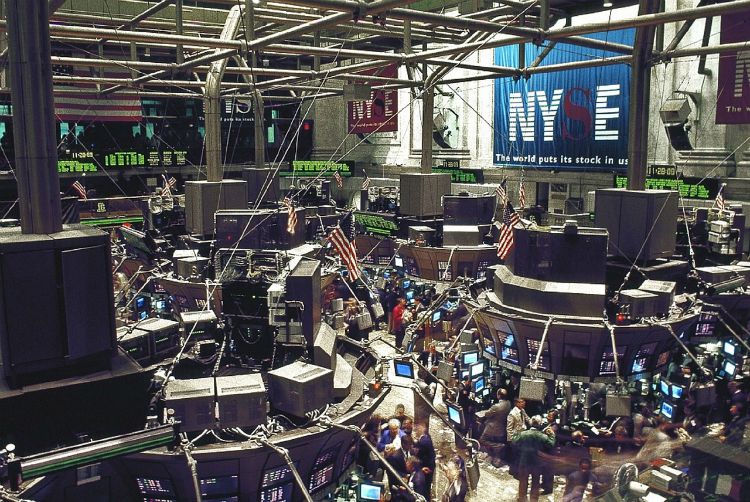Stocks
The Case for Holding US Stocks

U.S. stocks are expensive and interest rates are on the rise. Many pundits are predicting a crash in the U.S. market and history suggests that a recession is around the corner. Nevertheless, key policy changes, higher wages, and rising optimism could keep the U.S. bull market alive for the foreseeable future.
Prophets of Doom Come Out of Woodwork During US Stock Market Volatility
When early 2018 saw a significant market correction of about ten percent across major U.S. stock market indices, the perma-bears came out of their slumber and appeared on the front page of major publications.
To make their case, popular Internet personalities such as Peter Schiff, Jim Rogers, and Heisenberg cite statistics on unsustainable government debt, household debt, lackluster wage growth, high P/E ratios, and brewing asset bubbles produced by QE and near-zero interest rates for almost a decade now. To be fair, these commentators make a strong argument that put the fear of economic collapse in even the most rosy-eyed investors.
Yet, had you taken their advice a year ago by shorting the Standard & Poor's 500 index and buying gold, you would be in the hole for a lot more money than if you had bought the S&P 500 in fall 2008 and sold it in the winter for a drop. This might be cherry-picking the data, but the fact remains that any combination of bearish assets over the short term is likely to lose you more money than bullish assets over the same term. And over the long term, there is no contest.
Consumers, Small Businesses Paint a More Positive Picture of US Markets
Average Americans do not own stock and have not experienced boomtown over the last decade of U.S. market growth. Instead, they have gone through a long and slow recovery and are only now beginning to see their wages reach pre-crash levels.
As a testament to their improved situation, consumer confidence has soared to a 17-year high and small business confidence has hit an all-time record. With increased take-home wages, Americans will have more money to spend and invest, which has a good chance of pushing U.S. stocks and markets higher – and small caps and retail stocks in particular.
Optimism Bolstered by Tax Cuts, Higher Wages, and Pro-Business Environment
President Donald Trump’s tax cuts and regulation slashing are helping to drive consumer and small business optimism. The modest income tax changes have already increased most Americans’ wages, helping to provide economic stimulus and a resurgence of broad economic optimism.
But the main thrust of the GOP tax bill is the drastic reduction of corporate tax rates to a more competitive level compared to countries around the world. This move signals that America plans to remain a pro-business economic powerhouse, and over the long run, this will benefit the American worker and U.S. markets as companies use their extra cash to expand operations, provide competitive wages, and keep facilities on American soil.
Headwinds on the Horizon, Cautious Optimism Suggested
Despite signs of optimism, the United States faces major economic and social headwinds. In the short term, there is uncertainty around rising interest rates and the ongoing Mueller investigation. And in the long run, the U.S. is bound to experience deep political fractures and increased cynicism in the existing civic structure.
Furthermore, wage growth is still slow and U.S. stocks are somewhat expensive. The Shiller P/E ratio is around 26, which is higher than the historical mean of 15 but still nowhere near the frothy high of 123.7 in 2009. Of course, nobody knows what will happen if a recession occurs before interest rates rise and the Fed has no way to stimulate the economy further.
The U.S. market has had a good bull run and may have reached a temporary peak. U.S. markets, however, may be worth the extra cost, given the high potential future growth on the horizon and America’s unique position as the global hegemon with the reserve currency. Compared to anemic, politically uncertain Europe, the U.S. market looks rather bright – at least for a developed economy.
Holding US Stocks Over the Long Term is the Path of Least Resistance
There is no firesale on U.S. stocks, and it’s difficult to recommend a big purchase of exclusively U.S. markets at this time. This doesn’t change the fact that the stock market is the greatest money-making machine in human history, with the S&P 500 being the all-star performer. As inflation and interest rates rise, investors have to continually protect their assets from devaluation.
To date, the tried and true method for protecting and growing wealth is to buy and hold a broad mix of assets classes, and historically U.S. stocks have been one of the safest and most profitable assets you can own. With this in mind, investors may want to cautiously hold U.S stocks and diversify their portfolios, rather than selling out of U.S. markets entirely.
















Pingback: The Capitalist: “The Case for Holding US Stocks” – Dan Bablinskas